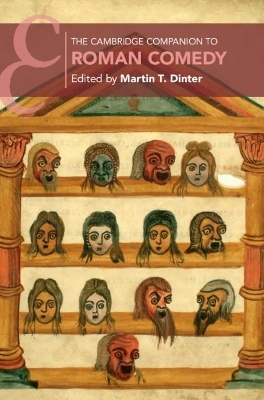
The Cambridge Companion to Roman Comedy
Cambridge University Press (Verlag)
978-1-107-00210-4 (ISBN)
The Cambridge Companion to Roman Comedy provides a comprehensive critical introduction to Roman comedy and its reception through more than twenty accessible and up-to-date chapters by leading international scholars. This book defines the fundamentals of Roman comedy by examining its literary and comic technique as well as its stagecraft and music, and then traces the genre's influence through the centuries. Roman comedy has served as a model for writers as well as artists ranging from Shakespeare to Molière and from Martin Luther to Cole Porter. Just as the Middle Ages spawned Christianised versions of Terence's comedies, in which harlots find God rather than a husband and young men become martyrs rather than never-do-well lovers, the twentieth century has also given us its take on Roman comedy with Stephen Sondheim's A Funny Thing Happened on the Way to the Forum and numerous modern versions of Plautus' Amphitryon.
Martin T. Dinter is Senior Lecturer in Latin Language and Literature at King's College London. He is author of Anatomizing Civil War: Studies in Lucan's Epic Technique (2013) and co-editor of A Companion to the Neronian Age (2013) as well as three volumes on Roman declamation: Reading Roman Declaration: The Declamations Ascribed to Quintilian (2016), Reading Roman Declaration: Calpurnius Flaccus (2017) and Reading Roman Declaration: Seneca the Elder (forthcoming). He has written articles on Roman drama, Roman epic and epigram, and is currently working on a book on Cato the Elder.
List of extant plays by Plautus and Terence; Introduction: Roman comedy Alison Sharrock; Part I. The World of Roman Comedy: 1. Plautus and Terence in their Roman contexts Gesine Manuwald; 2. Native Italian drama and its influence on Plautus Costas Panayotakis; 3. Roman comedy and the poetics of adaptation Mario Telò; 4. The politics of Roman comedy Robert Germany; Part II. The Fabric of Roman Comedy: 5. Stage action in Roman comedy C. W. Marshall; 6. Music and metre Timothy J. Moore; 7. Comic technique Isabella Tardin Cardoso; 8. Metatheatre David Christenson; 9. The language of Roman comedy Evangelos Karakasis; Part III. The Sociology of Roman Comedy: 10. Fathers and sons Martin T. Dinter; 11. Slaves and Roman comedy William Fitzgerald; 12. Mothers and whores Dorota Dutsch; 13. Gods and Roman comedy Anna Clark; 14. Legal laughter Andreas Bartholomä; 15. Family finances Elaine Fantham; Part IV. The Reception of Roman Comedy: 16. The reception of Republican comedy in antiquity Gesine Manuwald; 17. The manuscripts and illustration of Plautus and Terence Beatrice Radden Keefe; 18. The anti-Terentian dramas of Hrotsvit of Gandersheim Marek Thue Kretschmer; 19. Roman comedy in early modern England Robert S. Miola; 20. Roman comedy in early modern Italy and France Céline Candiard; 21. Roman comedy in Germany (from humanism to Lessing) Florian Hurka; 22. Roman comedy on stage and screen in the twentieth and twenty-first centuries Céline Candiard.
| Erscheinungsdatum | 23.05.2019 |
|---|---|
| Reihe/Serie | Cambridge Companions to Literature |
| Zusatzinfo | Worked examples or Exercises |
| Verlagsort | Cambridge |
| Sprache | englisch |
| Maße | 156 x 235 mm |
| Gewicht | 840 g |
| Themenwelt | Literatur ► Lyrik / Dramatik ► Dramatik / Theater |
| Geschichte ► Allgemeine Geschichte ► Vor- und Frühgeschichte | |
| Geschichte ► Allgemeine Geschichte ► Altertum / Antike | |
| Geisteswissenschaften ► Sprach- / Literaturwissenschaft ► Anglistik / Amerikanistik | |
| Geisteswissenschaften ► Sprach- / Literaturwissenschaft ► Literaturwissenschaft | |
| ISBN-10 | 1-107-00210-9 / 1107002109 |
| ISBN-13 | 978-1-107-00210-4 / 9781107002104 |
| Zustand | Neuware |
| Haben Sie eine Frage zum Produkt? |
aus dem Bereich


